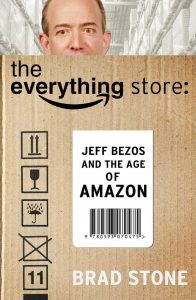
Looked at the rapid growth of internet and asked what all will get disrupted by this. Came up with many ideas and DE Shaw actually launched a few.
Couldn’t create an Everything store on day 1 so had to choose a product category. Chose books.
Kept generating more orders than they could service. Increasing backlog was ok rather than saying no to business.
Built a culture focused on hardwork early on..
VC impressed by energy and tech skills of founder. Showed real time report.
Bezos insisted on Doerr taking a board seat and not some junior member from the VC.
Get big fast… Scale gets advantage like better margins. Whoever build lead first would also retain it. The VC round triggered this thinking.
Rufus dog of early employees. Belief that Rufus needs to bless new projects
Similarities.. the code written to recommend books basis past purchases made. Showed immediate results. Great advantage of ecommerce. Brick n mortar can never truly understand the customer and customize for them.
Hire employees who have disregard for the usual way of doing business .
Toys category template for the platform business. Got upfront cash. Ran the ecomm for AOL.
In short term stock market is a voting machine. In long term it is a weighing machine.
Customer obsession. Harry Potter book at 40% discount same day. Many PR stories.
Single product page. Unlike ebay. Created the most comprehensive product catalog online. list sellers on the same page alongside their own inventory. The pages that customers flock to. Changed the way Amazon approached marketplace model.
Bezos was clear in 2000 that by the time they get to 20Bn in sales, half should come from selling others products. Via fees earned on its infrastructure.
Did not care about upsetting everyone else in the industry.
Learn from everyone. Costco. Sam Walton.
Jim Collins explained the flywheel.. kept it a secret. Influence any part of the flywheel to build growth.
1.Understand the limitations but kept your principles
After learning about the Internet, an idea of ‘The Everything Store’ began to form within Bezos. He understood that he wouldn’t be able to commence everything at such a large scale from the start. So he decided to focus on selling books. But he made sure it was the biggest book store and would offer the best book-buying experience for customers.
2.Less communication, the better
Bezos believes that communication should be seen as a flaw. Instead, leadership should be planning ways to communicate less. It would enable workers to understand their requirements naturally without prompt.
He went to the extent of banning PPT presentations. He insisted that employees should write down their pitch when introducing new ideas.
3.Consumer-Centric
Bezos always leaves one chair empty in every meeting. The chair represents the customer. Till today, Amazon strives to optimize its customer experience relentlessly. Frugality is the principle for Amazon and they focus on cutting costs in every conceivable way. This helps pull in customers. They are known for discounted prices, even when they incur losses. This increased the customer base and was a long-term strategy to grow the business.
# Key Takeaways:
– Jeff Bezos’ relentless focus on customer satisfaction and long-term growth has been the driving force behind Amazon’s success.
– The company’s culture of innovation, risk-taking, and data-driven decision making has allowed it to constantly evolve and stay ahead of competitors.
– Bezos’ leadership style, characterized by high standards, frugality, and a willingness to experiment, has been instrumental in Amazon’s growth.
– The company’s emphasis on constantly expanding its offerings and investing in new technologies has allowed it to become a dominant player in multiple industries.
# Practical Applications:
– The concept of customer obsession can be applied in any business, as it ensures that the company is always focused on meeting the needs and wants of its target market.
– The importance of a strong company culture and leadership style can be applied in any organization, as they are key factors in driving success and growth.
– The strategy of constantly expanding and investing in new technologies can be applied in industries that are constantly evolving and facing disruption.
# Valuable Insights for Leaders and Managers:
– Chapter 3: “The Everything Store”
– This chapter delves into the early days of Amazon and Bezos’ vision for the company, providing valuable insights into his leadership style and the company’s culture.
– Chapter 6: “The Virtuous Cycle”
– This chapter explores Amazon’s business model and how it has allowed the company to continuously grow and innovate.
– Chapter 9: “The Platform”
– This chapter discusses Amazon’s expansion into new industries and the importance of constantly evolving and adapting to stay ahead of competitors.
# Effective Case Studies and Examples:
– The launch of Amazon Prime and its impact on customer loyalty and sales.
– The development of Amazon Web Services (AWS) and its success in the cloud computing industry.
– The acquisition of Whole Foods and its integration into Amazon’s business model.
Leave a Reply